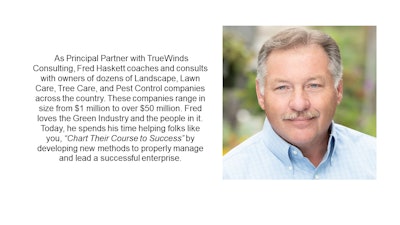
It takes more time, energy, and marketing dollars to find a new client than to sell more work to an existing customer who already knows how great your landscaping, lawn care, or tree care services are. Despite this, many green industry companies focus heavily on acquiring new customers, often overlooking the potential revenue from their existing client base.
While it's crucial to continually seek new customers, it's equally important not to miss easy cross-selling opportunities with those who already trust your services. Have you ever been on a client’s property only to hear, “Oh, I’m sorry, I didn’t know you did that kind of work, so I called XYZ company”? This scenario is all too common and represents a missed opportunity for both you and your client.
The reality is that customers often don't remember all the services you offer, even if you've told them multiple times. Just because you handed them a brochure about your tree care services when they signed up for lawn care doesn't mean they kept it. Just because you gave them a mulching estimate three years ago doesn't mean they'll remember you when they need mulching next spring.
Effective cross-selling strategies
Even if you're excelling at inbound marketing, outbound tactics can be highly effective for cross-selling services to your existing customers. Here are several strategies that have proven successful:
1. Include Promotional Materials in Normal Correspondence
You regularly leave bills on doors, send invoices, mail renewal letters, send pre-pay offers, and distribute quarterly newsletters. These touchpoints are excellent opportunities to subtly promote your other services or current promotions. Some printing software allows you to easily insert promotional messages into invoices and statements, or you can hire a local printing company to create inserts.
- Tip: Provide pricing when possible. Customers are more likely to inquire about a service if they see an affordable price.
- Offer Example: Instead of a generic “10% off,” try something more enticing like “$150 off!”
2. Implement Team Lead Programs
Finding additional sales can be as simple as ringing your customer’s doorbell after completing a service. Production workers spend significantly more time on a property than salespeople, and clients often trust those who get their hands dirty.
- Tip: Train your crew leaders and technicians to recommend additional services. Customers are more likely to accept suggestions from the people they see regularly.
- Sales Team Reminder: Ensure your sales team treats these leads seriously to maintain trust and morale among your production workers.
3. Utilize Email Marketing
While you don’t want to overwhelm your customers, setting the right expectations from the start can make your emails welcome. A couple of promotional emails each year can be effective if the majority of your communication is helpful and informative.
- Tip: Segment your database and personalize your emails. Use catchy subject lines, concise copy, attractive images, and clear calls to action.
- Content Idea: Even if customers don’t click, seeing a subject line about plant health care keeps your services top of mind.
4. Adopt Soft-Sell Telemarketing
Many people find telemarketing annoying, but a well-executed campaign can uncover significant cross-selling opportunities. Make the majority of the call about thanking the customer for their business, and suggest additional services as an afterthought.
- Tip: Ensure your telemarketers sound authentic and can gracefully accept if the customer declines.
- Customer Respect: Have a system to remove customers from future calls if they express discomfort.
5. Conduct Proactive Property Visits
Show genuine concern for your customers by visiting their properties for complimentary inspections. This gesture demonstrates care and can uncover potential needs they might not have noticed.
- Tip: Provide value even if the customer doesn't purchase an additional service. For example, pointing out a weed problem they weren’t aware of can build goodwill.
Why cross-selling works
Cross-selling not only increases your revenue but also strengthens your relationship with your clients. By consistently offering valuable services, you become a trusted advisor rather than just another service provider. This approach can lead to more sales, referrals, and a stronger client base.
Steps to simplify and improve processes
Improving your processes doesn’t have to be complicated. Here are practical steps to keep your processes simple and effective:
- Examine the Problem Physically:
- Collaborative Analysis:
- Ask "Why" Five Times:
This method not only helps in finding the root cause but also prevents the blame game, fostering a culture of collective problem-solving. By involving your team in this process, you ensure that solutions are more comprehensive and sustainable.
Eliminating waste in processes
To improve your processes, focus on eliminating waste. Add steps only if they add value to the outcome. Always consider the perspective of both internal and external clients:
- Internal Clients: You or your team members.
- External Clients: Customers, vendors, or partners.
When examining a process, ask these critical questions:
- "What does the team need from this process?"
- "What does the client want from this process?"
By answering these questions, you can ensure that your processes are effective and efficient.
Practical tips for continuous improvement
- Design with Specific Outcomes:
- Measure and Evaluate:
- Simplify and Standardize:
- Encourage Team Involvement:
Boost revenue and strengthen client relationships
Effective cross-selling strategies can significantly boost your revenue and strengthen your client relationships. By utilizing promotional materials, team lead programs, email marketing, soft-sell telemarketing, and proactive property visits, you can ensure that your customers are aware of all the services you offer and think of you first when they need additional work.
Remember, it’s not just about selling more; it’s about providing value and building lasting relationships. As Arnold Glasow said, "One of the true tests of leadership is the ability to recognize a problem before it becomes an emergency." By anticipating your customers' needs and addressing them proactively, you can maintain their loyalty and grow your business.
Editor's Note: This article was written by Fred Haskett of TrueWinds Consulting.











